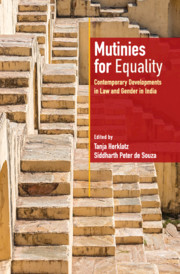12 - The Politics of Regulating Adult Sexuality through the Institution of Marriage: Reflections on Queer Experiences from India
Published online by Cambridge University Press: 08 June 2021
Summary
Introduction
In this chapter, I use queer methodology to critique the dominant kinship structure (the social institution of marriage, more specifically) as it exists under the juridical and socio-cultural frames in India. Using this methodological framework, we understand that heteronormativity1 is the ideological instrument that organises kinship. Heteronormativity being the norm produces two conjoint expectations from the individuals: first, all individuals must perform either as male or female as they are biologically sexed either as male or female; second, love, sexuality or any kind of intimate expression must be between opposite sexes. This is constituted as the natural order of things—a (hetero)norm. Any deviation from this (hetero)normative order of things is treated with impunity—thus, making the heterosexual matrix a compulsory regime of coherent and continuously replicating arrangement of power relations. It guides an individual's agency, expressions, prospects, ambitions and performances—thus, making heteronormative governance a quotidian phenomenon in their lives.
Kinship consists exclusively of relationships that are either products of conjugality or marriage, both of which work to keep the dominance of heteronormativity secure. Thus, marriage, being ubiquitous in the socio-cultural senses of its being, is deployed at the service of heteronormativity. Culturally, Indian society considers marriage as an inalienable part of adult life—one's reaffirmation in the regime of compulsory heterosexuality, as queer theorists would call it. From a queer standpoint then, marriage acquires the potential to snare up its new candidates to heights of delusion, privilege, compulsion, often regret, tyranny and oppression. Living under these real-life heteronormative frames that impose marriage, the central questions that this piece of research asks is: How do vulnerabilities operate in queer lives, and how does the queer respond to such vulnerabilities? Here more than a concept, ‘vulnerability’ offers a political language that helps to explore the queer's location, power and agency within/outside heteronormative governance.
Based on my qualitative study of seven queer narratives across urban and semi-urban India, I demonstrate how and in what ways ‘marriage’ can act as a tool for formally/informally regulating/governing queer lives through the structural bodies in domains both public and private. In what ways does the queer respond to the technologies of heteronormative governance?
- Type
- Chapter
- Information
- Mutinies for EqualityContemporary Developments in Law and Gender in India, pp. 225 - 241Publisher: Cambridge University PressPrint publication year: 2021



